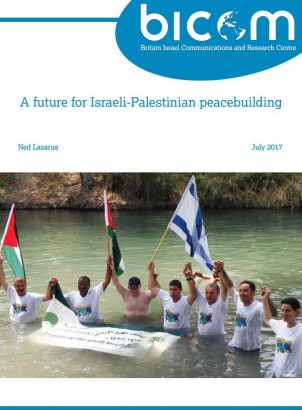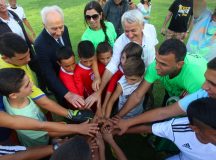BICOM and Fathom have published a new research report, A future for Israeli-Palestinian peacebuilding. It has been written by Ned Lazarus, visiting Professor at George Washington University and before that the Middle East Program Director for Seeds of Peace from 1996-2004, with a preface by Jonathan Powell, the chief British negotiator during the Northern Ireland Peace Process. This comprehensive landmark study shows that grassroots Israeli-Palestinian peacebuilding projects work, are a vital missing ingredient in the Israeli-Palestinian peace process, and should receive much more support from the international community.
Key findings include:
- Policy makers should learn the lessons from the Northern Ireland peace process. Well-funded peace building projects that brought the two communities together were in place 12 years before the Good Friday Agreement and helped make it possible. They remain in place today, to protect the agreement and show that long-term investment in peace building can bring lasting change to intergroup relations in a conflict environment.
- Peace building creates peacebuilders and constituencies for peace. For example, 17.5 per cent of participants in a programme run by the NGO Seeds of Peace went on to dedicate their careers to peacebuilding work.
- Peace building changes attitudes. Peacebuilding programmes significantly improve Israeli and Palestinian participants’ attitudes to one other. Ninety per cent of participants in a project run by the Near East Foundation said that they trusted the other community more after being in the programme.
- Peace building creates trust and empathy between the two peoples. A programme led by the Parents Circle Families Forum found 80 per cent of participants were more willing to work for peace and 71 per cent felt more trust and empathy towards the other community.
- Peace building projects change policy. For example Eco-Peace, an Israeli-Palestinian-Jordanian environmental NGO has helped Israel double its water supply to the Palestinian Authority.
- Sustained follow up is vital for success. One-off encounters were less successful than those that involved follow up meetings. The Seeds of Peace programme found that alumni involved in follow up meetings were twice as likely to remain active in the long-term than those that didn’t.
- Despite the experience of Northern Ireland, and the evidence of successful peacebuilding in Israel and the West Bank, the UK is investing very small amounts in peace building projects. Just 0.2 per cent of the £68.5m DfID spends in the Palestinian Territories is invested in peace and coexistence projects.
- The report concludes that the UK should join, and contribute significantly, to an International Fund for Israeli-Palestinian Peace, following the successful model of the International Fund for Ireland (IFI).
The report can be found here:
Also, editor Alan Johnson’s op-ed on why Fathom and BICOM commissioned the report can be read here.
Endorsements
John Lyndon, Executive Director of OneVoice Europe and Visiting Fellow at King’s College London, has called the report ‘timely and necessary,’ providing ‘a blueprint for greater international support of civil society efforts to foster conflict resolution’.
Elias Zananiri, Vice-Chairman of the PLO Committee for Interaction with the Israeli Society, says the ‘important and timely’ report ‘helps remove stereotypes and enmities between the two parties to the conflict, and that is exactly why this effort is needed’.
Ron Gerlitz, Co-Executive Director, Sikkuy: the Association for the Advancement of Civic Equality, said the report is ‘of utmost significance,’ providing ‘professional knowledge and invaluable insights’ and laying ‘a solid foundation for the promotion of Palestinian-Israeli peace and equal and shared society inside Israel’.
MK Hilik Bar, Deputy Speaker of the Knesset and head of the caucus for the resolution of the Israeli-Arab conflict, describes the report as ‘comprehensive and important’ that helps to resolve ‘three elements from preventing peace between the two sides – perceptions of self-interest, each peoples’ trust for the other and the courage of leaders’.
Dr. Nimrod Goren, Head of Mitvim, The Israeli Institute for Regional Foreign Policies, says ‘the timely report by Dr. Ned Lazarus, which provides an in-depth look at the future of Israeli-Palestinian peacebuilding, is of high relevance and importance’.






































Some excellent articles and hopeful, promising work. I would like to receive regular copies of your journal.